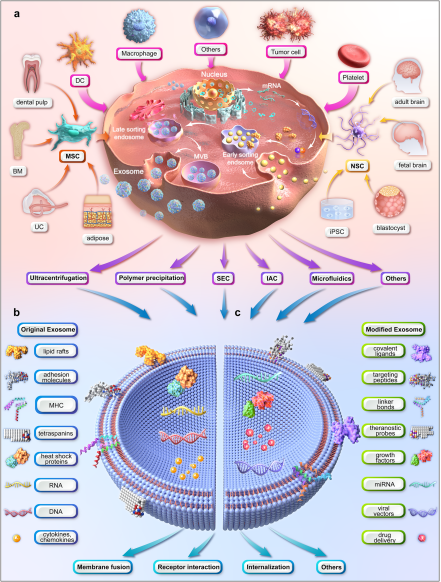New Anti-Aging Favorite – Stem Cell Exosomes
What are Stem Cell Exosomes?
Researchers discovered exosomes within sheep reticulocytes in 1983 and Johnstone officially named them “exosomes” four years later in 1987. Cells release exosomes which are extracellular vesicles measuring 30-150 nanometers across and contain a complete membrane structure. Exosomes have membranes that consist predominantly of both lipids and proteins. Besides proteins multiple nucleic acids such as DNA, mRNA, microRNA and ncRNA have been discovered within its content. Exosomes function as “information messengers” between cells and have the ability to manage tissue repair processes, anti-inflammatory responses and cellular regeneration.

The main function of exosomes as “communication soldiers” involves transmitting multiple signals and directives from one cell to another which helps regulate and enhance cellular performance. Thirteen years ago James E. Rothman who directs the Department of Cell Biology at Yale University earned the Nobel Prize for his discovery about how exosomes deliver their contents precisely. The Nobel Prize in Physiology or Medicine was awarded to Dr. Victor Ambros and Dr. Gary Ruvkun in 2024 for their groundbreaking research on microRNA which revealed its function in post-transcriptional gene regulation.
Stem cell exosomes have stem cell properties including homing ability for directional migration and low immunogenicity while they also serve as effective carriers for bioactive substances like mRNA, microRNA and proteins. Stem cell exosomes possess properties that make them superior in controlling tissue regeneration and repair processes. Stem cell exosomes lack the ability to react to damaged microenvironments but they control cell apoptosis and cell growth along with proliferation and differentiation pathways through modifications of the extracellular matrix and recipient cells’ transcriptome and proteome.
What is the Cause of Aging?
The essence of human aging is actually the aging of cells. The core signs of aging include: cell aging, genomic instability, epigenetic changes, protein homeostasis imbalance, stem cell exhaustion, chronic inflammation and abnormal intercellular communication.
The aging of human skin is a complex process, from the epidermis to the dermis. For example, the decline of keratinocyte proliferation ability, abnormal fibroblast function, flattening of the papillary layer, changes in the composition and content of the extracellular matrix are common pathological and physiological changes of endogenous and exogenous skin aging.
The cause of skin aging as a whole is usually attributed to gene mutation, telomere abnormality, increased protein and cell damage, inflammation, cell aging plus endogenous stem cell exhaustion and other problems.
Skin problems are attributed to cells, and there are the following situations:
- Intercellular Communication Interruption
If there is a problem with the skin, such as inflammation, the intercellular communication system will be affected, resulting in the skin’s self-regulation function not functioning normally.
- Damaged Cells
Damaged cells will lead to a shorter cell life cycle, slower cell renewal, and problems with cell metabolism.
- Decreased Cell Activity
When the human body begins to age, the overall activity of skin cells will decrease. Therefore, anti-aging is more direct from the cellular level!
A good skin barrier function is the best way to keep the skin healthy. If there is no healthy skin (epidermis), there is no need to consider the youthfulness of the skin. The dermis determines whether it is hydrated, plump and elastic, and whether wrinkles appear.
How do Stem Cell Exosomes Fight Aging?
- Promote Cell Repair and Regeneration
Stem cell exosomes deliver growth factors and cytokines to damaged skin cells which helps them rejuvenate while also activating collagen production to produce firmer and smoother skin.
- Delay Signs of Aging
Research indicates stem cell exosomes contain powerful antioxidants that eliminate aging cell damage factors while preventing oxidative damage from reactive oxygen free radicals and reducing wrinkle and spot formation.
- Improve Inflammatory Status
Chronic inflammation functions as a primary force that accelerates the aging process. Stem cell exosomes contain bioactive substances that control immune system function while also diminishing inflammatory responses and reviving skin with healthy shine.
Advances in Preclinical Research on Stem Cell Exosomes For Anti-Aging
Preclinical research has demonstrated significant advancements with stem cell exosomes for anti-aging applications. Research indicates that exosomes derived from stem cells have demonstrated improved outcomes for aging-related diseases through multiple pathways including inflammation reduction and oxidative stress alleviation while stimulating cellular regeneration and angiogenesis. Exosomes from young rat bone marrow mesenchymal stem cells successfully reverse aged bone marrow mesenchymal stem cells from old rats by lowering β-galactosidase activity and reducing levels of aging-related genes like p21 and p16. When umbilical cord mesenchymal stem cells overexpress NAMPT exosomes they produce yield stronger anti-aging results in the Caenorhabditis elegans model increasing lifespan by 31%. Exosomes from mesenchymal stem cells support skin anti-aging by enhancing skin fibroblast proliferation and migration as well as boosting collagen production while simultaneously decreasing oxidative stress and inflammation in skin tissues.
Related Services
